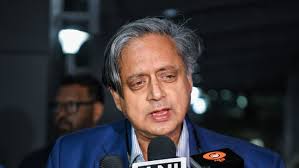Restraint in our reaction praised: Tharoor; flagged Pakistan military-terrorist nexus: Prasad

Amid rising geopolitical tensions and domestic political discourse, senior political leaders from opposing parties have found rare common ground on the matter of India’s handling of Pakistan-related provocations. While Congress MP Shashi Tharoor lauded the Indian government’s measured response to recent border provocations, senior BJP leader Ravi Shankar Prasad strongly criticized the deep-rooted connection between Pakistan’s military establishment and terror networks.
The two statements—though from different ideological standpoints—reflect a shared concern for India’s security and a call for a nuanced diplomatic approach amid growing threats in the subcontinent.
Tharoor Hails Restraint as Strength, Not Weakness
Speaking at a press briefing, Shashi Tharoor—known for his diplomatic finesse and foreign policy expertise—highlighted that restraint in foreign affairs should not be misconstrued as inaction or weakness. Referring indirectly to India’s handling of recent ceasefire violations and cross-border incursions, Tharoor emphasized the importance of calm, calculated diplomacy in avoiding unnecessary escalation.
“In the modern world, strength is shown not by reacting impulsively but by responding wisely. India has demonstrated a mature understanding of global diplomacy by choosing restraint over retaliation,” Tharoor said.
He further pointed out that India’s strategic patience serves to reinforce its global image as a responsible power, especially at a time when international scrutiny of regional conflicts is increasing. According to Tharoor, India’s firm yet restrained approach has helped isolate Pakistan diplomatically while keeping global opinion on India’s side.
Prasad Highlights Dangerous Nexus Between Pakistan’s Military and Terrorism
While Tharoor focused on diplomacy, former Union Minister Ravi Shankar Prasad took a more hardline stance. Speaking to the media in New Delhi, he accused Pakistan of continuing its long-standing policy of harboring and aiding terrorist elements, under the covert guidance of its military establishment.
“The Pakistan military is not just complicit, it is the architect of terrorism that targets India. From funding to training, this nexus poses a real threat to regional peace,” Prasad asserted.
He referenced multiple intelligence inputs and global reports—like the Financial Action Task Force (FATF) watchlist designation—that have exposed the institutional backing of terror outfits operating from Pakistani soil. Prasad also urged the international community to hold Pakistan accountable, calling for increased pressure through diplomatic and economic means.
A Bipartisan Consensus on National Security
Though from opposite sides of the political aisle, both Tharoor and Prasad appear to be voicing complementary positions: one emphasizing diplomacy, the other calling for global action against state-sponsored terrorism. This subtle alignment sends a strong signal to adversaries that India’s political leadership is unified when it comes to protecting national interests.
Analysts view this as a healthy development in Indian politics, where issues of national security often become deeply politicized. A senior political analyst noted, “It’s encouraging to see leaders like Tharoor and Prasad converging in their perspectives. Tharoor’s backing of government restraint and Prasad’s emphasis on international pressure together offer a balanced approach.”
Global Attention on Pakistan’s Alleged Terror Links
The timing of these statements is significant. With upcoming international forums, including the UN General Assembly and BRICS summits, India is expected to bring up the issue of cross-border terrorism. Pakistan, already struggling with internal political instability and economic crisis, faces renewed pressure as global bodies continue to scrutinize its failure to act against terror safe havens.
The Financial Action Task Force (FATF) had only recently removed Pakistan from the “grey list” after repeated international pressure. However, ongoing attacks by groups like Jaish-e-Mohammed and Lashkar-e-Taiba continue to raise doubts about Pakistan’s real intentions.
India’s ability to maintain strategic restraint while gathering international support could be a game-changing diplomatic tactic in the current scenario.
Domestic Reactions and Public Sentiment
Within India, the issue has also stirred public conversation. Social media platforms are abuzz with debates, with many users praising the Indian government’s calm approach. Others, however, argue for stronger retaliatory actions against cross-border provocations.
A Delhi-based defense expert, Colonel (Retd.) S. Mehta, weighed in, saying:
“Retaliation is sometimes emotionally satisfying, but geopolitics is about outcomes, not feelings. Restraint combined with pressure works better in the long run.”
The BJP has reiterated its commitment to a “zero-tolerance policy on terrorism”, while the Congress continues to emphasize global diplomacy and multilateral engagement. Yet, in the current case, both parties seem to be acknowledging each other’s perspectives—a rare but welcome moment of bipartisan unity.
Conclusion: A Dual-Track Strategy for India
India’s evolving foreign policy appears to be shaped by a dual-track strategy: assertive diplomacy on one hand, and global exposure of adversaries on the other. Tharoor’s praise of restraint adds intellectual weight to India’s diplomatic choices, while Prasad’s spotlight on Pakistan’s military-terror nexus reinforces the need for vigilance and global awareness.
This balanced response, rooted in wisdom and strength, may well become the template for India’s future responses in times of regional provocation.






